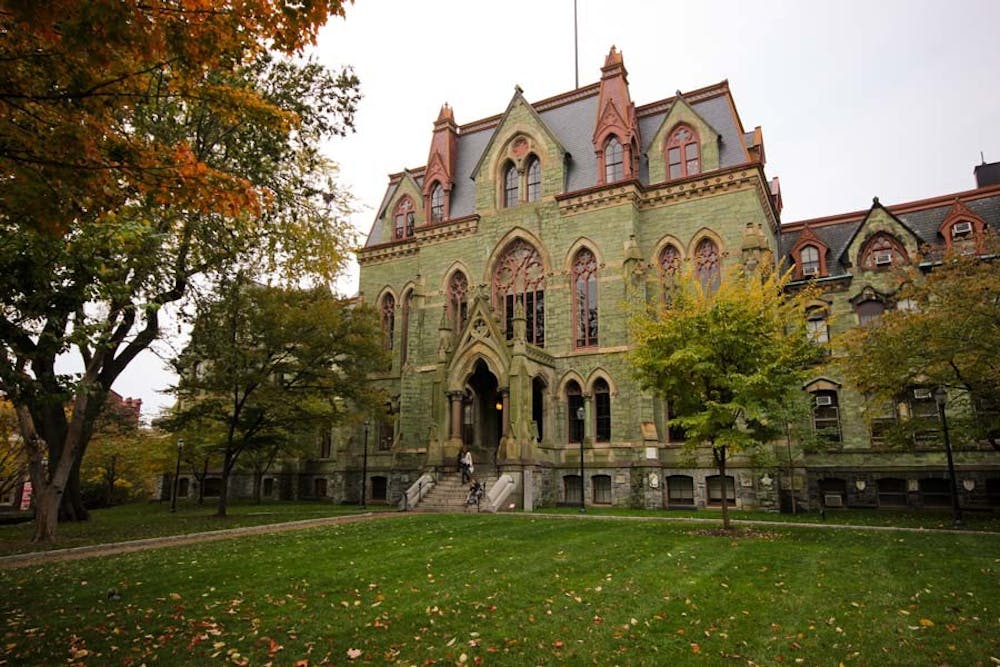On Monday, the Reaccreditation Steering Committee released a draft of its self-study report to the university community as part of Penn’s self-study during the reaccreditation process.
The report, which can be found on the Provost’s website, concludes that Penn is effectively educating undergraduates, but also contains recommendations for improving undergraduate education in the future.
Reaccreditation occurs every 10 years and involves an “in-depth” analysis of “one aspect of campus life,” according to the Provost’s website. In 2004, members of Penn’s reaccreditation team focused on Ph.D. education. This time, the process has been centered on undergraduate academics.
At the Trustees’ Meeting on Academic Policy last week, Andrew Binns, the vice provost for education and the chair of the Reaccreditation Steering Committee, said that those involved in reaccrediting the university have concluded that “we have the academic wherewithal to achieve what we say we’re doing.”
“Related: Board of Trustees meetings: new buildings, reaccreditation, sexual violence”: http://www.thedp.com/r/44b89d58
However, Binns and his colleagues agree that Penn could improve its efforts in certain areas. In the report, they outlined six key objectives that they recommend the University work toward in the next five years.
One area in need of continued attention is that of undergraduate socioeconomic diversity. While the report commends the University’s no-loan policy adopted in 2008, it calls for additional financial aid and outreach efforts.
However, Gutmann noted that there are obstacles to increasing financial aid spending.
“We have doubled the amount that our endowment contributes to financial aid,” Gutmann said at the Trustees’ meeting. “But 80 percent of our spending on financial aid still comes out of our operating budget. We wouldn’t want to have a policy that is not fiscally responsible.”
Related: Socioeconomic issues fall by the wayside in diversity dialogue
Another key recommendation is to continue to focus on making research opportunities accessible to undergraduates. “We’ve quadrupled the number of research opportunities available through CURF and there’s still more demand than there is supply,” Gutmann acknowledged.
“It’s good that students have to be enterprising here but we don’t want to make it a hurdle,” she added.
Other recommendations included further strengthening engagement in the local community, encouraging “cross-school study for undergraduates” and creating innovative methods of instruction.
Since October 2012, members of the university community have been working on compiling the information for the self-study report.
From May 2012 to May 2013, participants were organized into “working groups” to evaluate the execution of different aspects of the Compact, such as Access and Equity or Local Engagement. 85 faculty members, 12 undergraduate students and several members of the administration have contributed to this process.
Michelle Ho, Engineering senior and chair of the Student Committee on Undergraduate Education, was one of the students involved in the self study. Ho said she helped to host several events that brought together undergraduate students and the chairs of several of the working groups throughout the past year, among other things.
Related: SCUE begins work on policy report
Robert Nelson, executive director for Education and Academic Planning, who was involved in compiling the report, said that any feedback from members of the Penn community who “haven’t been deeply embedded in the process” will be welcomed.
He added that the Middle States Commission on Higher Education, the non-governmental organization that oversees Penn’s reaccreditation, expects the Steering Committee to seek expansive feedback.
Any member of the Penn community can view and submit feedback on the final report. An electronic feedback form on the Provost’s website will remain open until December 20. The Steering Committee will then review the comments and make edits to the self-study report.
A final draft of the self-study report will then be submitted to an external evaluation team in February. MSCHE chooses the members of the evaluation team, although “we have the ability to yell and scream if we think the people they’re giving us don’t have the knowledge base to review us,” Gutmann said at the Trustee’s meeting.
Related: Penn commences self-study as part of reaccreditation process
Gutmann herself has chaired the reaccreditation team for Brown University and participated in reviewing Yale and Stanford universities’ reaccreditation in the past.
Penn’s 2014 evaluation team will be chaired by John DeGioia, president of Georgetown University. DeGioia and his colleagues will come to campus in late March and submit their own report to MSCHE for review.



